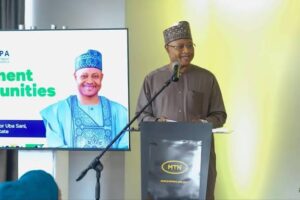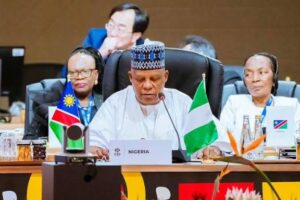Nigeria’s push for global investment took center stage at the G20 Summit in Johannesburg as the Federal Government’s high-level delegation—led by Vice President Kashim Shettima and accompanied by Minister of Finance and Coordinating Minister of the Economy, Wale Edun, along with several state governors—engaged international partners in a series of strategic dialogues aimed at unlocking multi-sector growth opportunities across the country.

Among the standout engagements was the Investment Breakfast Dialogue organized jointly by the Nigerian Investment Promotion Commission (NIPC), the Nigerian High Commission in South Africa, and MTN Group. The forum brought together senior policymakers, global financiers, multinational corporations, and state executives seeking to deepen Nigeria’s investment footprint.

Speaking at the event, Kaduna State Governor Uba Sani showcased his state as one of Nigeria’s most competitive destinations for investment, emphasizing Kaduna’s consistent ranking in ease of doing business and its track record of reform-driven governance. He described Kaduna as “Nigeria’s most attractive investment hub,” noting that the state had deliberately positioned itself to absorb large-scale capital inflows across key economic sectors.

Governor Sani identified four priority industries shaping Kaduna’s investment agenda:
Agriculture, Transport, Solid Minerals, and Renewable Energy.
He highlighted Kaduna’s pioneering initiatives such as the Special Agro-Processing Zone (SAPZ), the Agricultural Quality Assurance Centre (AQAC), the state’s integrated transport reform blueprint, the rollout of Compressed Natural Gas (CNG) buses, and ongoing rail and energy projects designed to support industrial expansion.

According to the governor, these initiatives are part of a deliberate strategy to create a modern, competitive economy powered by infrastructure, innovation, and investor confidence. “Kaduna State is open for business,” he told participants. “We have created a predictable policy environment, strengthened institutions, and built partnerships that ensure investors can operate efficiently and profitably.”

Participants at the forum responded with strong interest, engaging Governor Sani and other government officials on opportunities in large-scale farming, agro-processing, logistics, mineral development, green energy, and technology-driven services. Many investors commended Nigeria’s renewed macroeconomic reforms and the commitment of state governments to deepen subnational investment readiness.
Governor Sani used the platform to reaffirm his administration’s determination to sustain policies that have positioned Kaduna as a leading destination for domestic and foreign capital. He noted that the state’s long-term plan includes expanding energy access, modernizing transportation systems, strengthening agricultural value chains, and unlocking the untapped mineral resources scattered across its 23 local government areas.

The Kaduna governor also praised President Bola Ahmed Tinubu for implementing reforms that have improved national competitiveness and empowered states to pursue global partnerships more effectively. He credited the President’s macroeconomic reset—especially the unification of exchange rates, fiscal reforms, and renewed international engagement—for restoring investor confidence.
“President Tinubu’s economic direction has given states renewed leverage to attract investment,” Governor Sani said. “Nigeria is once again a serious contender for global capital because the Federal Government is providing clarity, stability, and leadership.”

Vice President Shettima, representing President Tinubu at the summit, reinforced the country’s message of economic openness, noting that Nigeria is prioritizing infrastructure renewal, industrial growth, and job creation. Minister Wale Edun echoed this commitment, assuring investors of Nigeria’s readiness to collaborate on sustainable projects that align with global trends in technology, clean energy, and commodity value addition.

Across multiple sessions, Nigeria’s delegation emphasized the country’s demographic advantage, expansive market, and the growing push to harmonize investment frameworks across federal and state levels. Governors from various regions also presented state-specific opportunities, underscoring the decentralized nature of Nigeria’s investment appeal.
For Nigeria, the G20 engagements signaled a fresh wave of international confidence, with several investors expressing readiness to explore partnerships across agriculture, mining, transport, ICT, green energy, and manufacturing.
As the summit concluded, one message resonated clearly: Nigeria is actively repositioning itself as Africa’s premier investment destination, armed with national reforms, ambitious state-driven initiatives, and an unwavering commitment to economic transformation.

Dr. Imran Khazaly.
The National Patriots.
G20 Summit, Johannesburg



